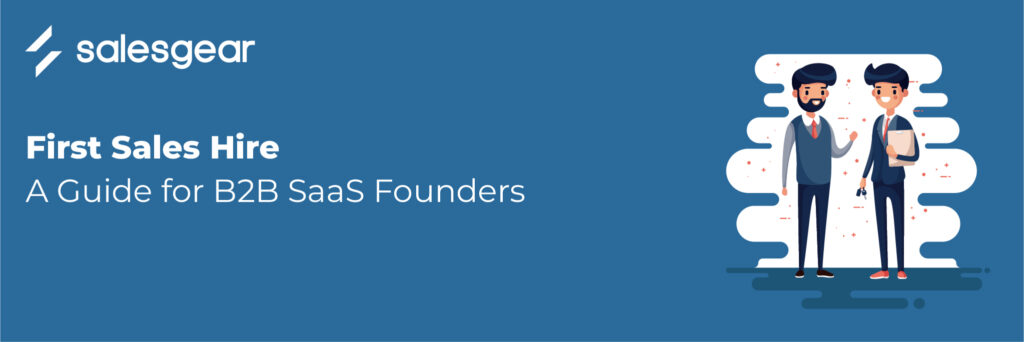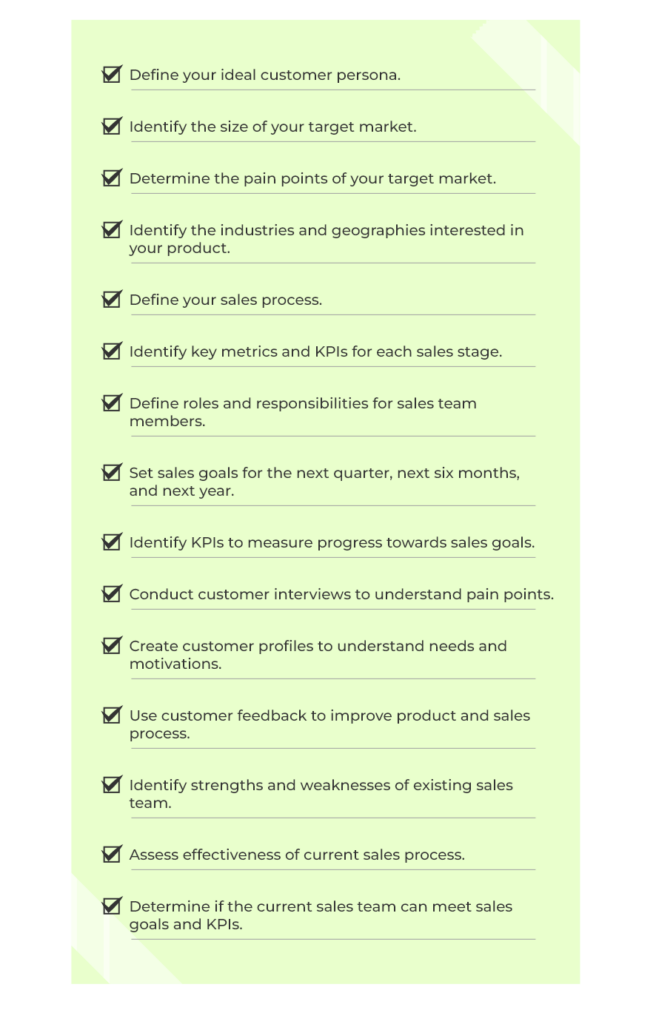
You’ve got a killer product, a talented team, and a vision to change the world for your target audience. But there’s one thing missing: sales. Sure, you’ve dabbled in selling your product to friends, family, and anyone who will listen, but it’s time to get serious. It’s time for your first sales hire.
So, where do you start?
How do you find the right person for the job? And how do you ensure that your salesperson is a success?
Is your company ready for hiring?
Do you have a compensation plan in place?
Do you have enough resources to train your salesperson once hired?
You will find answers to all these questions in this article. So sit back, grab a cup of coffee, let’s get started.

Assessing Your Company’s Sales Readiness
Before you plan for your first sales hire, it’s important to assess your company’s sales readiness. This involves evaluating your current sales process, identifying your target market, and setting sales goals and KPIs.
Here are some steps you can take to assess your company’s sales readiness:
1. Identify Your Target Market
As the founder, you should have your ideal customer persona defined already.
You should be sure to identify the size of your target market and determine the pain points of your target market.
You should also have an idea about the industries and geographies that are most likely to be interested in your product.
2. Define Your Sales Process
You should identify the stages of your sales process, from lead generation to closing the deal. If you are planning to hire more than one person, then you should also define the roles and responsibilities of each team member involved in the sales process.
Additionally, you can identify the key metrics for each stage in your sales process, if you’d like to track on a low-level.
3. Establish Sales Goals and KPIs
As the founder, you should set sales goals for the next quarter, next six months, and next year. You should identify the KPIs that will help you measure progress towards your sales goals.
You should also determine how often you will review and update your sales goals and KPIs.
Suggested Read: Mastering Outbound Sales KPIs: Your Key To Success [3 Free Templates Inside]
4. Understand Your Customer Persona and Their Pain Points
You should conduct customer interviews to better understand their pain points. This can be a bi-weekly or monthly meeting to catch up with your customers and check if they face any problem.
Based on these meetings, you can create customer profiles to help you understand their needs and motivations. These personas will help you train your salesperson effectively in the future.
Here’s a cheat sheet to assess your company’s sales readiness:

Defining the Role of the Salesperson
Before you think about hiring a salesperson, it is a given that you should already be a sales-led founder.
If you follow sales leaders like Jason Lemkin, you may know that the founder should try to sell the first $1M in revenue himself/ herself, hire 2 reps at a time, don’t hire a VP from a big company, etc.
But at a small company, things change quickly and it’s all about gaining momentum. It always helps when you have another pair of helping hands.
As the founder, this is where you need to decide what kind of salesperson you want to hire.
Here are some key factors to consider when defining the role of the salesperson:
1. Sales Experience
Look for a candidate who has experience selling SaaS solutions to businesses. They must be familiar at least with the basics – outbound lead generation, prospecting, deal closing, etc.
You should also be sure to check their track record of meeting and exceeding sales targets.
2. Communication Skills
The candidate should have excellent ability to articulate the value of your product and its benefits to potential customers.
For this, they should understand the pain of your prospects which leads to building strong relationships.
3. Technical skills
Look for a candidate who has a good understanding of technology and can quickly learn new products.
On top of understanding, the candidate should be able to communicate what the product does to the prospects/customers well as if explaining to a 4 year old kid.
4. Results-oriented
The candidate you pick should be driven by results. They should be self-motivated, should work independently and as part of a team to achieve sales goals.
They should have a strong work ethic and should be able to work under pressure. (salesperson, duh!)
5. Responsibilities
In most start-ups, founders act as the account executives. So, majorly the candidate should be doing –
- lead generation,
- prospecting,
- booking meetings for the AE (the founder) to close deals.
Creating a Sales Compensation Plan
One of the most significant decisions you’ll make when hiring a salesperson for your B2B SaaS startup is the compensation plan.
Your compensation plan should depend on the following:
- your sales goals and targets
- company’s budget and expenses
- company’s culture and values
- market rates
It should also motivate and reward your salesperson for their hard work and results. Here are some examples of sales compensation plans:
1. Base Salary + Commission
A base salary is offered to the salesperson, along with a commission for each sale.
Pro: Provides a steady income for the salesperson while still incentivizing them to sell
Con: Can be expensive for the company, especially if you are an early stage start-up, and may not motivate high-performing salespeople to reach higher sales targets
Example:
- An early-stage startup might offer a base salary of $40,000 per year, plus a 5% commission on all sales made.
- A mid-stage startup might offer a base salary of $60,000 per year, plus a tiered commission plan that increases from 5% for sales up to $100,000 per month to 10% for sales over $250,000 per month.
- A well-established SMB might offer a base salary of $80,000 per year, plus a 7% commission on all sales made.
2. Commission-Only
The salesperson is only paid a commission for each sale they make.
Pro: Motivates high-performing salespeople to make more sales, as they are paid for their performance
Con: Can be risky for the salesperson, as they may have periods of low or no income
Example:
- An early-stage startup might offer a 10% commission on all sales made.
- A mid-stage startup might offer a tiered commission plan that starts at 7% for sales up to $50,000 per month and increases to 15% for sales over $200,000 per month.
- A well-established SMB might offer a 10% commission on all sales made.
3. Tiered Commission
A commission rate that increases as the salesperson reaches higher sales targets.
Pro: Motivates salespeople to sell more, and rewards top performers
Con: Can be complicated to administer and may be difficult for salespeople to understand
Example:
A mid-stage startup might offer a base salary of $60,000 per year, plus a tiered commission plan that starts at 5% for sales up to $100,000 per month, increases to 7% for sales between $100,001 and $200,000 per month, and increases again to 10% for sales over $200,000 per month.
This shows how the commission rate increases as the salesperson achieves higher levels of sales, which can provide a strong incentive for them to sell more and contribute to the company’s growth.
4. Bonus Incentives
Bonuses are awarded for reaching specific sales targets, such as hitting a monthly or quarterly quota.
Pro: Provides an additional incentive for salespeople to hit their targets and can be used to reward top performers.
Con: Too expensive for a start-up.
Example:
- An early-stage startup might offer a $2,000 bonus for every 10 sales made.
- A mid-stage startup might offer a $5,000 bonus for hitting a specific sales target, such as $500,000 in monthly sales.
- A well-established SMB might offer a $10,000 bonus for achieving a specific annual sales goal, such as $5 million in sales for the year.
Sourcing and Interviewing Candidates
As a startup founder with a limited budget, it’s important to find cost-effective ways to source and interview candidates for your sales position.
Here are some steps you can take to find the right salesperson for your B2B SaaS company without breaking the bank:
1. Leverage your network
One of the most cost-effective ways to find candidates is to leverage your personal and professional network. Reach out to former colleagues, friends, family members, and mentors to spread the word about the job opening and ask for referrals.
2. Use social media
Make use of social media platforms such as LinkedIn and Twitter to post about the job opening and share it with your followers. This can help you reach a wider audience and increase the chances of finding the right person for the job.
3. Post job openings on free job boards
There are several free job boards you can use to post your job opening, including Glassdoor, Indeed, and LinkedIn. Take advantage of these platforms to reach a large pool of potential candidates without spending any money.
Onboarding and Training the Salesperson
Once you’ve the right first sales hire, the next step is to onboard and train them effectively.
Here are some tips and a 30-60-90 day sales plan to help you onboard and train your new salesperson:
1. Start with the basics
Begin by introducing your new salesperson to your company’s values, mission, and culture.
Provide them with an overview of your product or service and the industry you operate in. This will help them understand the big picture and develop a sense of ownership for their work.
2. Assign a mentor or buddy
Pair your new salesperson with a seasoned sales rep or a team member who can help as a mentor. This will provide them with the support and guidance they need to get up to speed quickly.
3. Provide training and resources
Provide your new salesperson with the necessary training and resources they need to succeed. This may include recorded product demos, sales collateral, competitive analysis, and market research.
4. Develop a 30-60-90 day sales plan
A 30-60-90 day sales plan can help your new salesperson focus on the right activities during their first few months on the job.
First 30 days, the focus should be on learning the product and the sales process. This includes attending training sessions, shadowing other sales reps, and getting familiar with the CRM system.
As the founder/sales manager, you should set goals for your salesperson. These goals should reflect the target numbers that you have planned to achieve.
Example: the goal could be to make at least 20 calls per day, 30 emails per day, book 1 meeting per week, etc.
Second 30 days, the focus should shift to developing relationships with prospects and understanding their pain points. This includes conducting demos and presentations, addressing objections, and following up with leads.
Example: The goal could be to close at least 5 deals by the end of the month.
Third 30 days, the focus should be on expanding the sales pipeline and generating referrals. This includes building a network of satisfied customers, cross-selling and upselling, and attending industry events.
Example: Acquire 2 more subscriptions from xyz customer, close 2 new accounts by the end of the month, etc.
Final thoughts
Hope this guide has provided you with useful insights and practical tips for your first sales hire in your B2B SaaS startup.
Remember, the success of your sales team can make or break the growth of your business.
By carefully assessing your company’s sales readiness, defining the role and responsibilities of your salesperson, creating a tailored sales compensation plan, and implementing an effective onboarding and training program, you’ll be better equipped to find the right candidate to help you achieve your business goals.
Good luck on your journey!